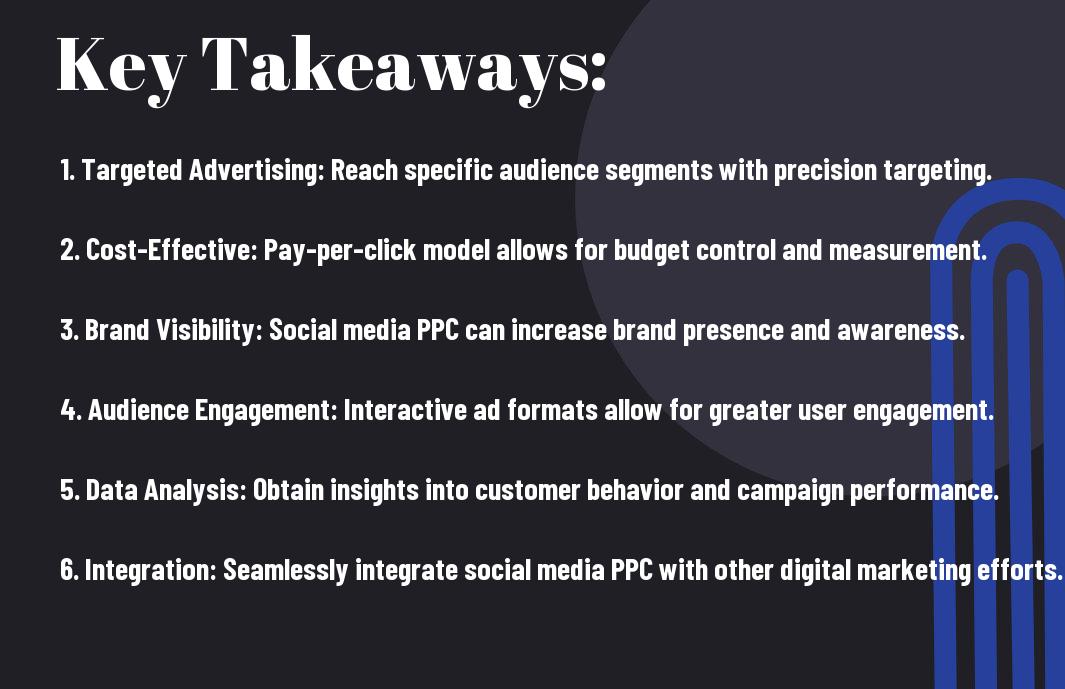Embarking on a digital marketing journey without harnessing the power of social media PPC is like sailing without a compass. In today’s digital landscape, social media PPC has emerged as a crucial tool for reaching your target audience, increasing brand visibility, and driving conversions. By utilizing paid advertising on platforms like Facebook, Instagram, and LinkedIn, you have the ability to target specific demographics, interests, and behaviors, ensuring that your message reaches the right people at the right time. Additionally, social media PPC allows for real-time performance tracking and optimization to maximize your return on investment. In this blog post, we will explore the important role that social media PPC plays in modern digital marketing, and how you can leverage it to achieve your business objectives.
Key Takeaways:
- Social media PPC offers precise targeting – With advanced targeting options, social media PPC allows advertisers to reach highly specific audiences based on demographics, interests, and behaviors.
- It facilitates customer engagement – Social media PPC campaigns enable direct interaction with the target audience, fostering engagement, and building relationships with potential customers.
- Social media PPC provides valuable insights – Through analytics and reporting tools, marketers can gain valuable insights into campaign performance, audience behavior, and trends, allowing for data-driven decision making.
- It enhances brand visibility and awareness – Social media PPC can significantly boost brand visibility, helping businesses to increase awareness, reach new audiences, and drive website traffic.
- It complements overall digital marketing strategy – By integrating social media PPC with other digital marketing efforts, businesses can create a cohesive and impactful marketing strategy that leverages the strengths of each channel.

Defining Social Media PPC
While you may be familiar with the concept of Pay-Per-Click advertising, it’s important to understand its role in the context of social media. If you’re not familiar with PPC, you can find more information on Why Pay-Per-Click Advertising is Important in Digital Marketing. Social Media PPC, or Pay-Per-Click, is a form of online advertising where you pay a fee each time your ad is clicked. This model of internet marketing has become increasingly popular due to its effectiveness in driving traffic and generating leads for businesses.
Pay-Per-Click Explained
Pay-Per-Click advertising allows you to bid on specific keywords relevant to your target audience. When someone searches for those keywords, your ad may appear at the top of search results or on social media platforms. You only pay if the user clicks on your ad, making it a cost-effective way to drive traffic to your website. This model allows you to control your budget and target your audience with precision, ultimately driving qualified leads to your business.
Platforms for Social Media PPC
Today, there are several social media platforms that offer Pay-Per-Click advertising options, including Facebook, Instagram, Twitter, LinkedIn, and Pinterest. Each platform has its own unique targeting options and ad formats, allowing you to tailor your campaigns to reach your specific audience. With the ability to target users based on their demographics, interests, and behavior, social media PPC provides you with the opportunity to reach your ideal customers where they spend their time online.
Strategies for Social Media PPC Success
To ensure the success of your social media PPC campaigns, it is important to implement effective strategies that will help you achieve your marketing goals. The following are key strategies that will help you leverage the power of social media PPC to maximize your marketing efforts and achieve your desired results.
Target Audience Identification
To maximize the effectiveness of your social media PPC campaigns, it is crucial to accurately identify and target your ideal audience. Understanding your target audience’s demographics, interests, and online behavior will enable you to create hyper-targeted campaigns that resonate with Social Media Marketing and Digital Amplification in Today’s … them. By pinpointing the specific characteristics of your audience, you can tailor your ad content to address their needs and pain points, resulting in higher engagement and conversion rates.
Crafting Compelling Ad Content
The key to a successful social media PPC campaign lies in the quality of your ad content. You need to create compelling, visually appealing, and relevant ad copies and visuals that capture the attention of your audience. Your ad content should offer value, communicate a clear message, and include a strong call-to-action that prompts users to take the desired action. Whether it’s driving traffic to your website, generating leads, or increasing sales, captivating ad content can significantly impact the success of your campaigns.
Budgeting and Bidding Strategies
Setting an appropriate budget and employing smart bidding strategies are essential for the success of your social media PPC campaigns. By carefully allocating your budget and adjusting your bidding strategies based on the performance of your ads, you can optimize your ROI and maximize your campaign’s effectiveness. Understanding how to effectively manage your budget and bidding will allow you to reach your target audience while making the most out of your available resources.
A/B Testing and Analytics
Utilizing A/B testing and closely monitoring analytics are indispensable for refining and optimizing the performance of your social media PPC campaigns. By testing different ad variations and analyzing the resulting data, you can gain valuable insights into what resonates best with your audience and make data-driven decisions to enhance your campaign performance. Regularly analyzing the data collected from your campaigns will enable you to identify areas of improvement and make necessary adjustments to ensure ongoing success.
Integrating PPC with Other Marketing Efforts
Keep in mind that while social media PPC is a powerful tool on its own, it can be even more effective when integrated with your other marketing efforts. By combining PPC with other digital marketing strategies, you can create a more comprehensive and cohesive marketing campaign that has a greater impact on your target audience. One way to do this is by incorporating social media PPC into your overall social media marketing strategy. You can learn more about Social Media Marketing for Businesses for better understanding and results.
Multi-Channel Marketing Synergy
When you integrate social media PPC with other marketing channels, you create a synergy that enhances the effectiveness of your overall marketing efforts. By combining PPC with SEO, email marketing, content marketing, and other tactics, you can reach your audience through multiple touchpoints, increasing brand visibility and engagement. This multi-channel approach allows you to reinforce your message and brand identity across various platforms, leading to greater impact and conversion rates.
The Role of Organic Social Media Efforts
While social media PPC can help you reach a larger audience and drive immediate results, it’s important to remember the role of organic social media efforts in your overall marketing strategy. By building an organic social media presence with compelling content, engaging with your audience, and fostering a community around your brand, you can complement your paid efforts and build long-term relationships with your customers. This combination of paid and organic social media efforts creates a well-rounded marketing approach that maximizes your reach and impact.

Case Studies and Industry Trends
After analyzing various case studies and industry trends, it is evident that the role of social media PPC in modern digital marketing is becoming increasingly important. Here are some compelling case studies that showcase the power of social media PPC in delivering results:
- Case Study 1: Company A saw a 35% increase in website traffic and a 20% increase in conversions after implementing a targeted social media PPC campaign.
- Case Study 2: Company B experienced a 50% reduction in cost per acquisition (CPA) and a 40% increase in customer lifetime value (CLV) through optimized social media PPC campaigns.
- Case Study 3: Company C achieved a 25% boost in brand awareness and a 30% improvement in return on ad spend (ROAS) by leveraging engaging social media PPC creatives.
Success Stories in Social Media PPC
When it comes to social media PPC, success stories are abound. From small businesses to multinational corporations, leveraging the power of targeted advertising on platforms like Facebook, Instagram, and LinkedIn has proven to be a game-changer. By reaching your target audience with personalized ads, you have the potential to significantly increase brand visibility, drive more traffic to your website, and ultimately boost your bottom line.
Future Outlook for PPC in Marketing
The future of PPC in marketing looks promising, but it also comes with its own set of challenges. With advancements in AI and machine learning, you can expect more personalized and automated advertising experiences. However, as competition intensifies, it’s crucial to stay ahead of the curve by continuously optimizing your PPC strategies and embracing new technologies. You’ll need to adapt to evolving consumer behaviors and preferences, all while keeping a close eye on industry trends and best practices to ensure the success of your PPC campaigns.
The Role of Social Media PPC in Modern Digital Marketing
On the whole, social media PPC plays a critical role in modern digital marketing strategies. By leveraging the power of targeted advertisements on platforms like Facebook, Instagram, and Twitter, you can reach a highly specific audience based on demographics, interests, and behaviors. This allows you to effectively promote your products or services, drive traffic to your website, and ultimately, increase your conversions. Additionally, the ability to track and analyze the performance of your social media PPC campaigns provides valuable insights for refining your marketing tactics and maximizing your return on investment. Incorporating social media PPC into your digital marketing efforts is essential for staying competitive in today’s online landscape.
FAQ: The Role of Social Media PPC in Modern Digital Marketing
Q: What is Social Media PPC?
A: Social Media PPC stands for Social Media Pay-Per-Click advertising. It is a form of online advertising where advertisers pay a fee each time their ad is clicked on social media platforms such as Facebook, Instagram, Twitter, and LinkedIn.
Q: How does Social Media PPC differ from other forms of digital marketing?
A: Social Media PPC allows advertisers to target specific demographics, interests, and behaviors of users, making it highly targeted and effective. Unlike other forms of digital marketing, Social Media PPC offers immediate and measurable results, allowing advertisers to track their ROI in real-time.
Q: What is the role of Social Media PPC in modern digital marketing?
A: Social Media PPC plays a crucial role in modern digital marketing as it allows businesses to reach their target audience in a cost-effective manner. It helps in increasing brand visibility, driving website traffic, generating leads, and ultimately, boosting sales and revenue.
Q: What are the benefits of using Social Media PPC in digital marketing strategies?
A: The benefits of Social Media PPC include precise targeting, cost-effectiveness, immediate results, increased brand awareness, higher conversion rates, and the ability to track and adjust campaigns in real-time based on performance data.
Q: How can businesses maximize the effectiveness of Social Media PPC in their digital marketing efforts?
A: To maximize the effectiveness of Social Media PPC, businesses should conduct thorough audience research, create compelling ad creatives, optimize landing pages, track and analyze campaign performance, and constantly refine their targeting and messaging to align with their business goals.
